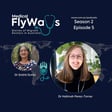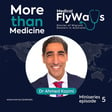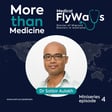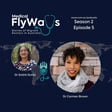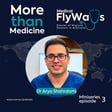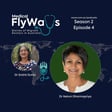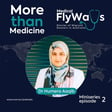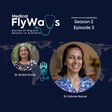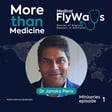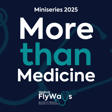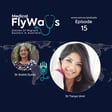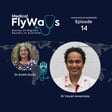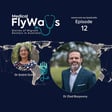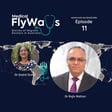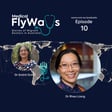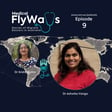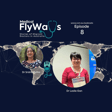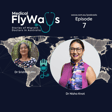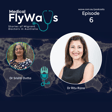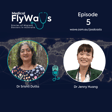Become a Creator today!Start creating today - Share your story with the world!
Start for free
00:00:00
00:00:01

Episode 13 - Dr Srishti Dutta
On this special bonus episode of Medical Flyways, Dr Srishti Dutta swaps seats for a candid chat with Lizzie New, Senior Brand & Marketing Manager at Wavelength International.
In honour of International Women's Day, the conversation ranges from Dr Srishti's journey from India to Australia via the UK, cultural learnings, balancing family and career, the road to equity in healthcare, and disparities in women's health.
Recommended
Transcript
Introduction and Sponsor Feature
00:00:01
Speaker
Medical Flyways, the untold journeys of migrant doctors in Australia.
00:00:13
Speaker
Hello and welcome to a very special episode of Medical Flyways. You'll notice a different voice opening the podcast today.
Spotlight on Dr. Srishti Dutta for International Women's Day
00:00:20
Speaker
My name is Lizzie and I'm representing Wavelength International, who's a medical recruitment organisation and a major sponsor of the Medical Flyways podcast.
00:00:30
Speaker
and I'm very honoured to be here today interviewing our usual host of Medical Flyways, Dr. Srishti Dutta, for ah special International Women's Day episode. I'm putting Srishti on the other side of the microphone, so to speak.
Journey to Australia and Family Influences
00:00:44
Speaker
Srishti, you're our guest today. and As the creator and host of Medical Flyways, our listeners have been able to get to know you a little over the series so far, but we know they're keen to learn more about your story and your career and your move to Australia. so Shristi, welcome to your podcast.
00:01:04
Speaker
Thank you very much, Lizzie. We'll start by saying that I could not have done this without the support from Rayblend. All of you, Claire, Carol, yourself, everyone has been very supportive of my vision, my ideas, my passion, and extremely respectful of not just what I bring, but whatever imperfections it has come with as well is how I would put it. And so that was quite refreshing for me coming from a medical background, because I think doctors are very self-critical and always willing to look at what went wrong, which is just the nature of the work we do.
00:01:45
Speaker
um And so, yeah, I was, um I almost felt like you guys were the wind beneath my sails. So thank you for interviewing me.
The Power of Storytelling and Vulnerability
00:01:53
Speaker
One of the main reasons I have i' had chosen to do this and asked you for your support was because almost everyone I sought out for the medical flyways interviews always used to say, well, what makes you think my story is worth telling?
00:02:08
Speaker
And from the other side, when I spoke to the people who had listened to the episodes, they would say, well, how do you find such phenomenal stories? And at the end of it all, what I've benefited from the most is understanding the The fact that each one of those stories has is special in its own way and the openness and the vulnerability and the courage that I've expected of my listeners is what I had to expect of myself too.
00:02:41
Speaker
So that's what made me kind of do this when I'm not always comfortable with the idea of putting myself in an episode. As you know, I've said that to you before.
00:02:52
Speaker
So that's why I thought we'd do this.
Career Journey from India to Australia
00:02:54
Speaker
My journey to Australia, well, I've been here for 10 years now. And that is the longest that I've lived in one place as an adult.
00:03:03
Speaker
which for some people will probably be surprising, but a bit of a nomadic lifestyle. I finished medicine in India and worked there for a couple of years and then decided to adventure outside of the usual ah restrictions and you know cultural norms and things that I had experienced until then.
00:03:25
Speaker
So I looked at the options of other countries and ended up with the UK, mainly because I had friends who were going there as well. The pathway was relatively straightforward compared to Australia.
00:03:40
Speaker
And I guess at that stage, I was looking at the costs involved with each country and felt that was the one that I was, that was the financial risk I was willing to put myself and my parents through, to be honest.
00:03:53
Speaker
and So I went to the UK there, was a good 10 years there. Australia had always been on the horizon because I have extended family in Australia. So that slight pull factor was that the factor that we would have more family around us.
00:04:10
Speaker
But the push factor then came from the fact that my older daughter had been born a bit, well, fairly early and the UK winters aren't conducive to having any medical issues. They're not kind on you.
00:04:27
Speaker
So we thought we'd seek out fickle, as it may sound, better weather. yeah I'm in Brisbane. Where else would you go? And you're you're not the first and you won't be the last, that's for sure. Absolutely. indeed So that's how we ended up in Australia, me and my husband and my older daughter.
00:04:43
Speaker
So yeah, we came here 2014.
00:04:47
Speaker
I'm thinking back before that growing up in India and you come from quite a medical background with both your mother and your grandmother as doctors of different sorts.
Family Influence and Career Choices
00:04:57
Speaker
So tell me a bit about that and did that influence your career at all do you think?
00:05:01
Speaker
Well I think yes. So my mum's an obstetrician and gynaecologist and my grandma has previously been a professor of psychology. The idea of being financially independent was quite, whether consciously or unconsciously, was certainly always very present. And I think they they belong to the the cohort of, i'm I'm trying to use sociological words, but you know there was a neoliberal feminist move in the world at that point. So financial independence was certainly very key.
00:05:34
Speaker
There was definitely an expectation of academic achievement. For me, I think medicine, i can't actually give you an example of when I thought about doing medicine, but there were so many formative experiences as a young child, so which is not that different from many others you'll hear in this world, like i seeing someone close in the family who had a medical episode and had needed help, obviously watching my mom support, sometimes family members as well.
00:06:08
Speaker
So yeah, it kind of felt like a natural progression. And if I was going to study, I was going to do something that I thought I would enjoy. So that's how I'm still doing clinical medicine. Well, 20 years post finishing med school, haven't left.
00:06:23
Speaker
yeah Don't intend to leave anytime soon. So yeah, so their um their influence was more around um feeling the need to be autonomous and independent. And the rest, I was always given a lot of choice.
00:06:37
Speaker
As to what I wanted to pursue and I chose medicine.
Transition from Psychiatry to General Practice
00:06:40
Speaker
And specifically general practice? Yeah, well, to begin with, i wanted to do psychiatry. So I sometimes refer to myself as a failed psychiatrist. so And I went to the yeah UK also because in India doing that would have had fewer choices and opportunities of training sites.
00:06:59
Speaker
yeah So I went to the UK, I did my initial clinical attachments as they're called or observerships they're called in in Australia in psychiatry, worked for two years in psychiatry, had completed an exam.
00:07:13
Speaker
Part of the fellowship was like, but then the UK training system had a major overhaul. It was called MTAS, which those of us who have been through it will all remember. so all trainees had to reapply for their jobs. Every doctor who was in training, it didn't matter where you were.
00:07:32
Speaker
You basically just had to reapply and previous contracts were null and void. So, well, you kind hedged your bets and you know, there was me and my husband whom I met in the UK and he had progressed further.
00:07:50
Speaker
So I moved to general practice. My early exposure to general practice was through ah family friend and mentor, Dr. Geeta Sahai, who looked after me when I moved to the UK.
00:08:02
Speaker
She had spoken very highly of general practice, allowing her and both the flexibility of being the multiple things we need to be, you know, moms, daughters, wives, and be a doctor.
00:08:17
Speaker
And she had special skills in and advanced skills in certain areas. So, She had spoken of it is and kind of given me an idea of it being fairly balanced and encouraged me to consider it as an option.
00:08:30
Speaker
So yes, I opted to go into GP training after having not done a lot of non-psychiatry medicine for a bit. So it was a bumpy ride to begin with, but came back, went into general practice and have stayed.
00:08:45
Speaker
what And does general practice with, I guess, the variety of, of, Yeah, I mean, I think it's interesting because we say that. yeah But for me, because when you are working or you've trained in a country outside of the usual Anglophone countries, as we call them, the idea of general practice is not a specialty as such.
00:09:08
Speaker
So it's and anyone who works in the community is a GP. But then when you look at the ah countries like Australia, so New Zealand, Canada, the UK,
00:09:19
Speaker
or the US with family medicine. It's a formal specialization. You train towards a fellowship and you don't just become a GP. You have to work towards being one.
Flexibility and Autonomy in Practice
00:09:32
Speaker
So when I did enter general practice, I was very, very lucky. I'll be honest. I think the reason i am much of what I am as a GP is because of my supervisor, ah Dr. Simon Coxage, who was also a faculty at Manchester University Clinical School.
00:09:50
Speaker
And in hindsight, now having been a supervisor, I have even more respect for the amount of support I must have needed at that point. He helped me kind of explore the extent to which I wanted to do it, while at the same time supporting me through the exams, allowing me to consider that this would be what I bless pursue as a career.
00:10:16
Speaker
The variety is what you want to make of it. yeah That's the beauty of general practice is you can narrow your scope as much as you want. You can expand your scope as much as you want. You can extend your scope as much as you want.
00:10:29
Speaker
And that kind of clinical autonomy that we have is probably very uncommon in any other generalist specialties in medicine. Do you think pursuing general practice has allowed you to or encouraged you with all the extracurriculars per se like you do?
Balancing Medicine with Personal Interests
00:10:49
Speaker
The extracurriculars are totally other. i think that my mentor will tell you that that's my lack of focus at times. But I think, yeah, so it's interesting. Almost everything I have done, when I look back and consider what's the reason to do it, mostly the value that drives it is learning.
00:11:09
Speaker
And so I tend to pick something that sits halfway between a challenge and just enough interest in shiny object like to go, Oh yeah, this looks interesting. And do you think you can do this, Rishi? Probably not. ah Well, let's have a go.
00:11:27
Speaker
So does get me into a bit of trouble sometimes, but it's still usually worth doing. And I find people along the way like yourselves who are also on their own adventure and happy to join forces.
00:11:40
Speaker
It's funny you say that. I say that, but there's a but here. My supervisor always encouraged me to have a portfolio career, as it's called, in the UK. I know we are more familiar with it now in Australia as well.
00:11:54
Speaker
And he always encouraged me to consider things that contribute to your clinical specialty without the activities actually being clinical. My first governance related meeting that I attended in the UK, which was clinic, CCGs or clinical commissioning groups are the equivalent of, or similar to PHNs here.
00:12:19
Speaker
So my supervisor took me along to one of those meetings and Interestingly, my self-care skills were fairly rudimentary. He got me a bacon butty for dinner that day. I still remember that.
00:12:34
Speaker
I didn't know what a bacon butty was, but I'd said yes to it It's ah a soft one sandwich with bacon. So that was my first meeting. I mean, I've done a fair amount of governance-related activities now.
00:12:49
Speaker
and consciously or unconsciously probably still try and model what I saw when I was training to be a GP. me So what does that look like for you now, you know, you're doing ah GP supervision work and supporting international medical graduates? It's pretty busy, hey? Yeah. yeah So I think there's this real interesting, look at or listen to some of Indra Anui's stuff, Indra Anui was the ex-CEO of PepsiCo in the US.
00:13:17
Speaker
Mm-hmm. In all honesty, I'm not going to say I agree with everything she says. and they haven't met anyone yet who I agree with 100%, but she describes this really interesting conflict that exists for most of us as women, which is your biological clock and your career clock are kind of ticking in tandem in the opposite directions.
00:13:36
Speaker
So I can tell the audience that the two people in this room are nodding vigorously and agreeing with me. So I think that's the trickiest part for most clinicians or women who have careers is that you get to this point where the demands or the expectations or the requirement, it doesn't really matter which word you use, or you have for yourself as a person, whereas what you have for the people that are closest to you, which is your family, and then what you expect to deliver in your work,
00:14:12
Speaker
And they all kind of, yeah they just seem like an insurmountable barrier and a mountain that's too big to climb. yeah So sometimes it feels like that.
00:14:24
Speaker
So in all honesty, but generally, and I will add, this is also thanks to my incredibly balanced husband. Very little seems to haze him. yeah.
00:14:35
Speaker
I'm still not sure whether he just hides it better than me or he deals with it better than me. I think it's more the latter, that he's generally been pretty good at making me go back to, well, why are you doing this?
00:14:48
Speaker
You know, why are the reasons what are the reasons to continue? And if you don't want to do it, stop doing it. So I think the kind of activities generally for me are similar in theme.
00:15:02
Speaker
The translation of those things, What I do can be the biggest challenge with competing time requirements, logistics, and the fact that we still only have 24 hours in a day. No more than that.
00:15:19
Speaker
So I'm not sure if that answers your question, but I think we all do what we can a little bit imperfectly and the best that we can. so So how do you find balance or at least moments of balance and clarity among all? Yeah, we did, we have discussed, you know, so I think for me, that the interesting part about balance is it's not static.
00:15:42
Speaker
It's a dynamic thing. And the fact that every day is not the same as the next is actually not a bad thing. There are things you can keep fixed. So I try these days to at least have one weekend day where I haven't got a lot of commitments, whether that's social or family or work.
00:16:00
Speaker
And so you need to give yourself space. If you have that space for yourself, the other things generally tend to fall into place. As simplistic as it may sound, if you're okay and you look after yourself, generally other people will look after themselves, little people aside.
00:16:20
Speaker
Thinking about, guess, similar to that, but ah for doctors in general or the healthcare workforce and thinking about where it is at the moment, what do you think differences or changes can be made to help doctors or help, you know, the healthcare professionals find that sort of thing. It's a big question. is Like in terms of my own, I'll share what I, my personal experience has been, which is I think medicine has the ability to make you feel very invincible.
00:16:51
Speaker
And I think, you know, particularly as a junior doctor, you're working these reasonably unrealistic hours, It's common practice when you're in hospital to have caffeine fuel days and keep cafe food in the hospital as your primary source of nutrition. So I'm not entirely sure where it comes from, but I do think that medicine allows you to feel like the things that you're looking after people in regards to medical problems aren't going to come and affect you in any way.
00:17:25
Speaker
If you ask me, I i don't understand where it comes from. It is definitely... I definitely feel that is real. And if you ask colleagues of mine, they will probably give you endless number of examples of doctors who, for lack of a better description, have allowed different standards for themselves.
00:17:43
Speaker
And honestly, I'm not any different from that. So I do think that better modelling of that is probably one way of doing it. Doctors who are not well often don't feel comfortable sharing that information as well.
00:18:00
Speaker
There are exceptions, but generally we, I don't know whether it's a failing or you so you see yourself then somehow less in your own mind than what you imagined yourself to be, right?
00:18:13
Speaker
So that's probably the biggest thing is we need to be more accepting of our own and imperfections and our own failures and our own mortality, which is a hard thing, but...
00:18:25
Speaker
And the general recognition that self-care is important. Self-care is funny, right? it's Self-care. Why do we have to define it? Looking after yourself is your first and primary responsibility to before anyone else.
00:18:37
Speaker
have a colleague here who is a psychologist and she often says, especially you need to practice what you preach. okay and And that's typically the hard part of being a healthcare care professional. I think you need to have ah have the ability to self-reflect and be critical but compassionate to yourself at the same time.
00:18:58
Speaker
And do you think, do are you seeing that similarly reflected in ah patient base and in community at the moment? It's a very good question. I think what I'm seeing is people are less willing to tolerate inauthenticity.
00:19:13
Speaker
o So you can't tell someone to do something without explaining why. And if that doesn't work for them, they will seek the answers that they need.
00:19:25
Speaker
So i still find that the expectation to provide answers definitely still there. Like, you know, healthcare care professionals are expected to be experts at whatever domain they're in, but I don't feel like people accept that as the one and the whole answer.
00:19:46
Speaker
yeah That is part of what they will use to integrate what they think is best for themselves. So that relationship is different now compared to probably ah couple of decades ago.
00:19:59
Speaker
And on that note, is there more of a movement or does there need to be more a movement towards that patient-centred care and really changing or adapting the methods of care and how you approach different people in different cultures, for example? Patient-centred care is interesting. You use the word.
00:20:18
Speaker
Care is always Patient-centered. Is the patient involved, able, and willing to be participant in their care? Now, there will be differing views on this from my colleagues, I'm sure.
00:20:33
Speaker
However, my view is that we have seen change in that. So as an example, we used to use medication, depends on where you look at compliance, concordance, adherence, different words.
00:20:49
Speaker
to reflect what that looks like from the patient's perspective. But I think like with all relationships, even in the what we class as a therapeutic relationship, what we need to seek is shared outcomes, shared values, and clear boundaries of who's responsible for what.
Patient-Centered Care and Shared Responsibility
00:21:09
Speaker
one So yes, as an expert, I can share the knowledge, and particularly in today's day and age, when a lot of the nuanced information is accessible to everyone, i can help you navigate that.
00:21:24
Speaker
I can be flexible in terms of what works for one person as opposed to another. But the boundaries of that are the limits of my knowledge and where I consider i might be ending up in an area where either consciously or unconsciously I might end up having, the patient might have harm. Mm-hmm.
00:21:46
Speaker
So in that sense, for me, it's a very broad space that I allow myself and the patient to operate in. Whether that needs to shift, it is tricky because it isn't always just individuals in the healthcare spaces.
00:22:01
Speaker
yeah It's organizations, entities, funders, call it what you will. <unk>s it's not always an individual decision, which is why I'm fiercely protective of my clinical autonomy, because that's the only thing that allows me to operate.
00:22:17
Speaker
in that way for the benefit of my patient.
00:22:21
Speaker
Thinking about the, you know, I guess the definition of patient-centered, and you and I have been talking a bit about changing language that we've noticed from equity to equality in healthcare.
Equity vs. Equality in Healthcare
00:22:32
Speaker
care Oh, yes.
00:22:34
Speaker
I've asked this question many times, and I know that the understanding depends on who you ask question, but the basic difference in terms of equity and equality is that equality means giving the same resources or all things to everyone.
00:22:51
Speaker
And that makes it equal. and And equity means giving each person what they need to reach a certain target or goal. And if you look at it from the perspective of population health, we know it differs.
00:23:05
Speaker
We offer different population groups, as an example, different resources, because we know their health needs are different. But I think we're selective in where we apply that and where we preferentially are happy with equal or settle for equality because equity is either unachievable or not supported.
00:23:27
Speaker
So, yeah. So, I mean, I'm again an advocate for equitable principles. Yeah. I think just unfortunately we don't live in a world where resources are infinite.
00:23:41
Speaker
So, everything has limit and sometimes even I have to accept those limits. me Diplomatic as it is. That's where I've landed in my pursuit of equity.
00:23:55
Speaker
I think the same applies for doctors, trainee doctors, international doctors who come to Australia and are arguably at a disadvantage with a bit of a culture shock coming to Australia, particularly rural and regional areas.
Challenges for International Doctors in Australia
00:24:09
Speaker
And think about your work in supporting these doctors, what are the some things in place to to help them overcome those barriers and and how does your work fit into that? My journey was interesting because, believe it or not, and I'm sharing this purely to just give people an idea of how complex the rules and regulations around this can be. So I had, before coming, spoken to a friend of mine who is a GP in Melbourne and she had explained the rules to me as best as she understood them, but they applied differently to me.
00:24:42
Speaker
And so having read the documents and the legislation and things that she suggested I do, I still hadn't, I interpreted it accurately and had concluded I needed to be in a regional or rural area, which in hindsight wasn't a requirement for me.
00:24:59
Speaker
So ah my initial contact was ah rural workforce agencies. They still do support a lot of international medical graduates or internationally qualified doctors.
00:25:11
Speaker
whichever version you want to use to come and work in outside of the metro areas and outer metro areas. I'm aware that there are several recruitment agencies that work in that space as well.
00:25:23
Speaker
And particularly around assistance with things like migration, because everyone's circumstances are different. The need for knowing the a certain level of, I guess, certainty around outcomes is different.
00:25:39
Speaker
So, I've informally spoken to a lot of people over time to try and help them understand the rules that apply nineteen a and 19-A-B, which is the the legislation around the moratorium and restrictions for Medicare.
00:25:55
Speaker
Particularly for those doctors that move from the UK, the systems in the UK are probably more, the word is not transparent, they're less individualized. So, for example, migration rules are potentially a lot less complex.
00:26:10
Speaker
So even I have this challenge of getting used to a different system and understanding not getting a reply from the um office this is not unusual. You're all smiling. So I guess we've all experienced it's some version of it. so So I've informally supported people.
00:26:29
Speaker
Formally, guess doing the podcast was my way of trying to ensure that visibility of these challenges. i wouldn't say that I expected an outcome other than some level of interest from the people that I work with and our peers and colleagues, which has been there. And and there's others that have ah you know said that they weren't aware of these things, which is normal.
00:26:57
Speaker
and and And this is not in a way a criticism of people who don't know purely because, you know, education theory says you don't know what you don't know. And probably allowing people ah degree of comfort to talk about these things.
00:27:10
Speaker
We don't talk about the things that are happening. We'll never know whether they are things we need to address or not. And yeah, that's where it started. i read a quote from Maya Angelou, I think, which says, you know, don't allow a story to go on with you, share it.
00:27:26
Speaker
And i just felt incredibly compelled to share the stories. so yeah, that's where we are. And are there any particular experiences of some of these internationally trained doctors that maybe inspired the stories that you did want to share going into rural areas? It is fascinating. It's a full spectrum. So I remember people I've met in the UK.
00:27:49
Speaker
i remember, I'll give you a different version of this. I, as an intern in India, noticed without naming the institution, cause that would be tricky that there were quite a few doctors that, so there were doctors that would train in the erstwhile USSR and then come back to India to practice. And I noticed there was this real sense of they weren't as good as the graduates in India.
00:28:19
Speaker
And I mean, of course, the graduate in India included me. And I remember questioning one of my family members who was supervising someone because they said something along the lines of, oh yeah, that person is a graduate from XYZ country. And I said, but he's, but you can't judge his knowledge and performance based only on that.
00:28:40
Speaker
So i think this is something that happens everywhere. Medicine is a profession where based on the nature of the work, every country has its standards and exams and I think it's fairly similar for the legal profession is my understanding.
00:28:57
Speaker
and is that It is not as easy to move between countries and practice. So while I understand that that's a requirement and with good reason, I probably and and sometimes maybe unrealistically have better expectations from fellow human beings.
00:29:14
Speaker
So it's where there are these biases which are conscious or unconscious that impact people contributing as well as they can. That's what really had bothered me, whether I was in India or UK or here.
00:29:31
Speaker
So, so the stories are the classic one that I don't even actually remember, Lizzie, if we've already had this one, but you know, bring a plate.
00:29:42
Speaker
Like in Australia, it's ah it's such a customary thing about bringing a plate. yeah And I remember a colleague telling me that they took a plate, an empty plate, because they had no understanding of what bring a plate meant and no one had explained to them what bring a plate meant.
00:29:57
Speaker
so and And only was got there and realized that, well, actually, it's a plate of food. And their host was very generous in that they put food on it for this person, for them not to feel embarrassed.
00:30:12
Speaker
But this person would have felt embarrassed irrespective. So it's a two way street. There's no reason why we can't be more welcoming. Also at the same time, no reason why people can't be willing to step forward to feel part of a community and a place.
00:30:28
Speaker
So I don't think, you know, it's unusual irrespective of where you are, that if you go somewhere new, there's a little bit of adjustment to be had. yeah My story of the UK.
00:30:41
Speaker
I have waited so long to share this one. Me and my friend went to the shopping center. We had never been outside India and we went shopping and we went up to the front and someone was leaving this the equivalent of calls in the UK.
00:30:56
Speaker
And they looked at the two of us and said, do you want the trolley? And we said, yes. And they they said, okay, well, I'll have a dollar. And We both looked at each other absolutely horrified that they wanted a dollar for the trolley, not realizing that when we we said no and walked over to the trolley stand to realize we still needed a dollar to get the jewelry.
00:31:24
Speaker
And we still talk about that day and laugh about what we were doing there. So it's the simplest of things like that to the more complex social interaction that can all feel, you know, alien, new, overwhelming. And and I think...
Cultural Adjustments and Kindness
00:31:41
Speaker
adventure is what you recall, is discomfort you recall at a later date when you're feeling positive about it, which is why i can laugh about it now. But the idea of giving away a dollar was not, it wasn't going to We were not giving away a dollar. So it was a pound there as well, not a dollar. But yes, you know the principle. So yeah, it can be anything.
00:32:05
Speaker
no So, but it's, you know, it's about human connection. It's about The fact that the guard had clearly seen more people like us. So he walked up to us and said, we needed a dollar for the trolley.
00:32:19
Speaker
And did we know how to use it? And showed us how to use it. And his kindness was enough for us to kind of feel less embarrassed about the whole situation. So, yeah. Yeah. I'm sure there are more stories like that out there.
00:32:34
Speaker
When you started the podcast and you were looking for ah partner to publish it with and found Wavelength, ah we are absolutely thrilled to ah partner with you and the work that we do with helping internationally trained doctors come and find homes in Australia.
00:32:52
Speaker
felt like a good fit to us, but what was it that felt a good fit to you?
Partnership with Wavelength and Future Projects
00:32:56
Speaker
Well, so i had periods in the process prior to meeting yourself and other members from Waverlength when I was, was not sure it was going to happen.
00:33:08
Speaker
So there were windows when my, when my kids prompted me to keep going or rather just went, what's happening with the podcast now? these They will not let me not to do this.
00:33:21
Speaker
And so Todd Cameron, who was my mentor through this, suggested that I speak to Claire and I think he really did feel that the values that the organization has of supporting people and ensuring they have a smooth transition of a certain sense of ownership and responsibility around the work that gets done was similar to what I would bring to the table.
00:33:48
Speaker
And I think he also understood that the experience that doctors have had with Wavelength has been such that the values are actually put into action. And they aren't just things you put on a project report or an annual report.
00:34:02
Speaker
yeah That level of authenticity was well-matched as well. So yeah, so as it happened, I then went on the website and did read about web length. And i do think the values were very similar.
00:34:15
Speaker
and And then it seemed a logical progression to have a conversation. We talked about things we would include. i do recall that there were certain issues, including potentially you know challenges faced by doctors who are coming from developing countries or under-resourced countries or even people from a different racial ethnic background were going to be things we brought up or came up if if it was part of the podcast.
00:34:45
Speaker
I think there was some clear alignment on that as well that allowed me to continue with the ideas I had originally had. So it felt pretty organic. Yeah.
00:34:57
Speaker
And has continued to be so. Absolutely. It has continued to be so. So we're yeah a year into the podcast and about to launch a mini-series, which we've titled More Than Medicine.
00:35:09
Speaker
you tell us a little bit about what to expect with that mini-series? Well, interesting. So as we discussed, the range of things I end up doing is also because I do get bored. So we've been recording and we've had some fantastic stories. And yes, to the audience, there are so many more that are lined up.
00:35:26
Speaker
But i I then started seeing colleagues who had passions outside medicine. In that sense, I don't have that. The podcast is probably my most creative venture to date.
00:35:38
Speaker
And then I started seeing people who had been acknowledged and had recognition from the term domains where they were, you know, presenting their work, you know, whether it's art or music or painting or photography.
00:35:55
Speaker
And so it kind of made me think, well, this is what a doctor is. They're ah they're a whole person, a whole human being. And we see ah little, you know, probably very snapshots of a person.
00:36:08
Speaker
and As you said, almost every one of those doctors makes a contribution to the communities and the countries they're in, in ways beyond what medicine can capture. And I have had some awesome colleagues, GP colleagues who were willing to be interviewed. So thanks to them as well, that we've managed to bring in the six, we're aiming for six episodes at this stage.
00:36:30
Speaker
But it also was very interesting that they all somehow felt that was fulfillment and purpose and joy. And all those things that keep burnout away were part of them both initiating and pursuing interests outside medicine.
00:36:48
Speaker
So allowing my goal is to share the stories as not just their successes, but their way of contributing to their peers' domains of life and maybe prompting people to give themselves permission to think of those things outside of medicine.
00:37:07
Speaker
Yeah, we'll see how it goes. I'm halfway through recording for the miniseries. Looking forward to it. Okay, thinking about this week, it's International Women's day and the theme for International Women's Day this year in 2025 is March Forward.
Barriers Women Face in Healthcare
00:37:24
Speaker
And thinking about the current climate or what it's like to be a woman in healthcare care and independent healthcare, doctor pursuing all these projects as a doctor and as everything else that you do.
00:37:38
Speaker
Do you feel like this, the your experience as woman healthcare professional is something that is easily attainable for other women in healthcare or there barriers that still need to be?
00:37:54
Speaker
how do I answer this? I've never considered what I've done to be exceptional in any way. I'm being very honest with you. I think I've always thought that if I could do it, then everyone else can as well.
00:38:06
Speaker
Whether that's a positive way of thinking of that or not, I don't know. But but the the reason I say it is because I've had privilege in some ways. I grew up in a country where female feticide exists and has. So, you know, to be a woman and be alive is a privilege.
00:38:25
Speaker
And it's not just my country, but in other countries too. But then it's not just about that. It's what you make of it. So there'll be always, as people say, a hundred excuses for not doing something, but one reason to go ahead and do it as well.
00:38:40
Speaker
There will always be barriers, but I've probably in the last few years been more cognizant of the success that any individual has is never down to just their own choices. Mm-hmm.
00:38:54
Speaker
There is so much more that every other person that they've encountered that has been part of their immediate environment, their family has contributed to in ways they may not even know.
00:39:06
Speaker
So I don't think this is a solo adventure for anyone. This is not about individual achievements. It's about being able to support the people that need it the most. So marching forward is not about one person. It's a collective effort.
00:39:21
Speaker
And I think I will say that I'm very much an intersectional feminist for whatever my understanding of it is that I also acknowledge that there have been many men who have been allies in ensuring that women can contribute to the best. It's a partnership. It's not a competition.
00:39:40
Speaker
So, but as equity would mean, we do need to have extra support and encouragement to, to kind of almost be able to work around structural barriers while we may not be able to knock them down.
00:39:54
Speaker
Do you think that extends to women as patients in healthcare as well? Yeah, keeping in mind, and should be fairly honest that I will, we have an election coming up, so no matter what I say here, I don't know if it will be right or wrong, but the answer is yes.
00:40:12
Speaker
And I think the primary reason for that is because our, and it doesn't really matter where you are in the world, but Structures around society, even when two people are in a relationship, broadly speaking, are aiming to do things equitably, they still run into the barriers that exist.
00:40:31
Speaker
So again, there's so much academic evidence about this, including books published, that there really isn't much point in me telling people this. they can They can go and read about it themselves, but we have paid parental leave, but we will usually find women taking or obeying it as opposed to men, do men who contribute equitably, not just equally to their households get recognition?
00:40:58
Speaker
Would they mind if they don't get recognition or do we see that as an exception? So have a ah lovely friend who, Catherine Jones, who once, and I hope Catherine you won't mind me sharing this here, said to me when one person does it, it's an exception.
00:41:16
Speaker
When two people do it, it becomes a norm. And when more people do it, it becomes a rule. And then it's normalized. So i think we need more of what we have managed to accomplish. and But we need to do it together.
00:41:28
Speaker
We tend to leave people out when we become more self-centric. So I genuinely think that while we do have to march forward, we shouldn't have to leave others behind.
00:41:43
Speaker
So yeah, that is my goal. And it continues to be my goal. I think that's a great place to leave our conversation today. so thank you so much, Shristi, for spending the last 45 minutes sharing your story.
00:41:58
Speaker
and as always to our listeners, if you have any colleagues or doctors that you would like to nominate, if you think other people have to hear their story, please let us know. you can email info at wave.com.au or head to wave.com.au forward slash podcasts.
00:42:16
Speaker
Medical Flyways is recorded on terrible land in Meanjin, Brisbane. This podcast focuses on overseas doctors and their families finding a home in Australia.
00:42:28
Speaker
We acknowledge and thank the traditional custodians of country throughout Australia and recognise the continuing connection to lands, waters and community.
00:42:39
Speaker
We pay our respects to Aboriginal and Torres Strait Islander cultures and to Elders past, present and emerging.
